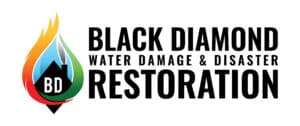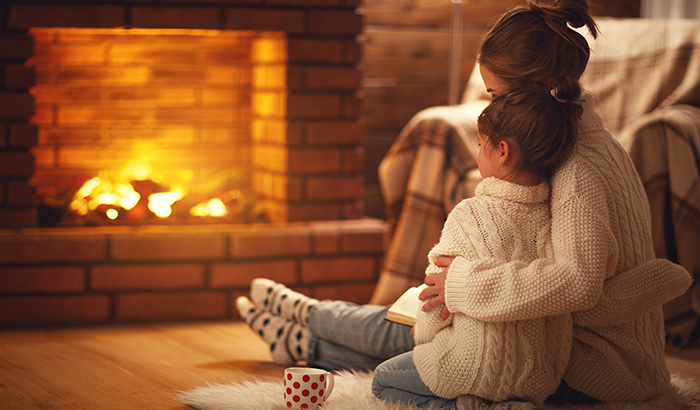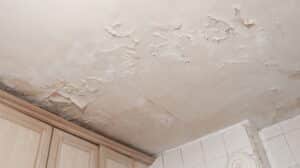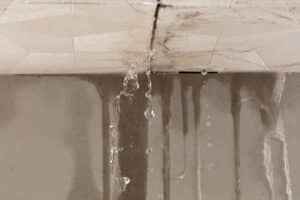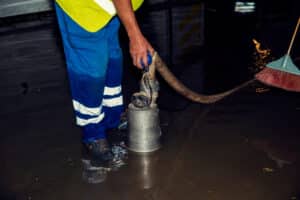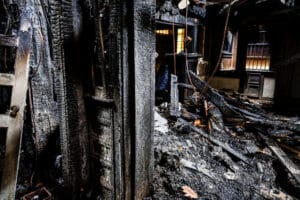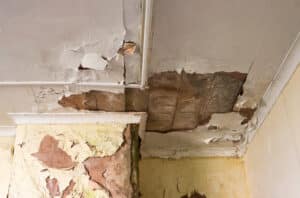Winter home fires can be devastating and are often caused by various factors, ranging from overheating or faulty appliances to holiday decorations. Understanding these causes and taking preventive measures is crucial for ensuring the safety of your home and loved ones during the colder months.
Below are 25 common causes of winter home fires and essential prevention tips:
1. Heating Appliances:
- Cause: Heating appliances like space heaters, furnaces, and fireplaces are common culprits for winter fires due to improper use or malfunctions. Space heaters may overheat or tip over, and furnaces can develop electrical issues, while fireplaces may have creosote buildup or malfunctioning components.
- Prevention: Follow the manufacturer’s instructions for properly installing, using, and maintaining heating appliances. Keep flammable materials at least three feet away from space heaters and ensure proper ventilation for furnaces. Have your chimney inspected and cleaned annually by a professional sweep to prevent soot buildup.
2. Electrical Overload:
- Cause: During the winter, people use more electrical devices simultaneously, especially around the holidays, leading to overloaded outlets and circuits.
- Prevention: Use power strips with built-in circuit breakers to prevent overloading. Unplug decorative lights and electronic devices when not in use. Spread your electronic devices across multiple outlets rather than using too many on one.
3. Candle Mishaps:
- Cause: Leaving candles unattended or placing them near flammable objects, such as curtains or decorations, can lead to fires.
- Prevention: Opt for flameless LED candles or, if using traditional candles, place them on sturdy, non-flammable surfaces, like ceramic or glass candle holders. Keep them away from curtains, papers, and other combustible items. Always extinguish candles before leaving the room or going to sleep.
4. Cooking Accidents:
- Cause: Unattended cooking, especially on stovetops, and grease buildup in ovens can cause kitchen fires.
- Prevention: Never leave cooking food unattended, and keep flammable items like oven mitts, towels, and curtains away from the stove. Clean grease and food residue from stovetops and ovens regularly. Consider using a timer or setting reminders when cooking to avoid forgetfulness.
5. Chimney Fires:
- Cause: Burning wood in a fireplace generates creosote buildup over time, which can ignite and cause chimney fires.
- Prevention: Have your chimney inspected and cleaned annually by a professional chimney sweep to remove creosote buildup. Use seasoned hardwood, as it produces less creosote than softwood. Install a chimney cap to prevent debris from entering the chimney.
6. Smoking Indoors:
- Cause: Carelessly discarded cigarette butts or ashes can ignite flammable materials.
- Prevention: Avoid smoking indoors altogether. If necessary, ensure cigarettes are fully extinguished in a non-combustible container, like a metal can filled with sand or water.
7. Holiday Lights:
- Cause: Damaged or old holiday lights can short-circuit and start fires.
- Prevention: Inspect holiday lights for frayed wires or broken sockets before use. Replace damaged lights promptly and avoid overloading outlets with too many decorations. Turn off the holiday lights before going to bed or leaving the house.
8. Flammable Decorations:
- Cause: Decorations made of paper, cardboard, or other flammable materials can easily catch fire.
- Prevention: Use fire-resistant decorations or keep them away from open flames, heaters, and electrical sources. Consider LED lights for your holiday decorations, as they generate less heat and pose a lower fire risk.
9. Portable Generators:
- Cause: Incorrect use of portable generators can lead to carbon monoxide poisoning or electrical fires.
- Prevention: Place generators outdoors in well-ventilated areas, away from doors, windows, and vents. Install carbon monoxide detectors inside your home and have a qualified electrician install a transfer switch to prevent back-feeding into the power lines.
10. Faulty Wiring:
- Cause: Outdated or damaged electrical wiring poses a significant fire hazard.
- Prevention: Have a licensed electrician inspect your home’s wiring regularly. Replace any frayed or damaged cords promptly. Avoid using extension cords as permanent wiring solutions.
11. Space Heater Misuse:
- Cause: Placing space heaters too close to flammable objects or leaving them unattended can lead to fires.
- Prevention: Keep space heaters at least three feet away from anything that can burn, such as curtains, bedding, or furniture. Turn off space heaters before leaving the room or going to bed. Select space heaters with safety features like automatic shut-off if tipped over.
12. Frozen Pipes:
- Cause: Attempting to thaw frozen pipes with open flames or high-heat devices can ignite nearby materials.
- Prevention: Use safe thawing methods like warm towels or a heating pad, and never use open flames to thaw pipes. Insulate pipes properly to prevent freezing.
13. Fireplace Safety:
- Cause: Leaving fireplace doors open or using improper fuels can cause sparks or embers to ignite flammable materials.
- Prevention: Always use a fireplace screen to prevent sparks from escaping. Burn only seasoned hardwood and avoid using flammable liquids to start fires. Never leave a fireplace unattended when lit.
14. Overlooked Fire Hazards:
- Cause: Ignoring potential fire hazards like lint buildup in dryers or clutter around electrical panels.
- Prevention: Regularly clean lint traps in dryers and clear the area around electrical panels to prevent overheating and potential fires. Store flammable items in designated areas away from potential ignition sources.
15. Faulty Appliances:
- Cause: Malfunctioning appliances, such as toasters, microwaves, or electric blankets, can short-circuit and cause fires.
- Prevention: Regularly inspect and maintain all electrical appliances. If you notice any strange smells or sparks, unplug the device and have it checked by a professional. Replace or repair faulty appliances promptly.
16. Blocked Heating Vents:
- Cause: Blocking heating vents with furniture or other objects restricts airflow, leading to overheating and potential fires.
- Prevention: Ensure that heating vents are clear of obstructions, allowing proper airflow and preventing overheating. Avoid placing rugs or furniture over vents.
17. DIY Heating Solutions:
- Cause: Homemade heating devices or unconventional methods for staying warm can pose significant fire risks.
- Prevention: Only use approved and certified heating appliances. Avoid using makeshift heating solutions like stoves or ovens for heating purposes, as these can lead to carbon monoxide poisoning.
18. Children and Matches:
- Cause: Curious children playing with matches or lighters can accidentally start fires.
- Prevention: Store matches and lighters out of reach of children, preferably in locked cabinets or drawers. Educate children about the dangers of playing with fire and consider implementing a fire safety plan in the case of emergencies.
19. Flammable Liquid Storage:
- Cause: Improper storage of flammable liquids like gasoline or kerosene can lead to fire hazards.
- Prevention: Store flammable liquids in approved containers and a well-ventilated area away from heat sources and open flames. Keep these liquids in a detached garage or storage shed outside the living area.
20. Unattended Firepits and Bonfires:
- Cause: Leaving firepits or bonfires unattended can lead to unexpected fires.
- Prevention: Always extinguish fires completely before leaving the area. Use water or sand to ensure the fire is entirely out. Keep a bucket of water or a fire extinguisher nearby for emergencies.
21. Dry Christmas Trees:
- Cause: Dry Christmas trees can easily catch fire from nearby heat sources, electrical sparks, or open flames.
- Prevention: Choose a fresh, green Christmas tree and water it regularly to prevent it from drying out. Keep the tree away from heat sources and unplug Christmas lights before going to bed or leaving the house.
22. Electrical Inspections:
- Cause: Faulty wiring and electrical issues can lead to fires, especially if they go undetected.
- Prevention: Schedule regular electrical inspections by a licensed electrician to identify and fix potential fire hazards. Pay attention to flickering lights, sparks, or warm outlets as warning signs of electrical problems.
23. Carbon Monoxide (CO) Poisoning:
- Cause: Malfunctioning fuel-burning appliances, such as furnaces and generators, can release carbon monoxide, a colorless and odorless gas that can be lethal.
- Prevention: Install carbon monoxide detectors on each level of your home and outside sleeping areas. Ensure proper ventilation for fuel-burning appliances, and never use a generator or grill indoors.
24. Dryer Vent Cleaning:
- Cause: Lint buildup in dryer vents can lead to overheating and potentially ignite a fire.
- Prevention: Clean your dryer’s lint trap after each load and schedule regular dryer vent cleaning to remove lint buildup. Avoid drying items with flammable materials or rubber, which can produce heat.
25. Flammable Fabrics and Upholstery:
- Cause: Fabrics and upholstery made from flammable materials can catch fire quickly.
- Prevention: Choose fire-resistant or fire-retardant materials for curtains, furniture, and decorations. Keep flammable fabrics and upholstery away from heaters, candles, and other open flames.
By familiarizing yourself with the detailed causes and adopting the comprehensive prevention tips for each risk, you can substantially diminish the chances of winter home fires, fostering a safer living environment for you and your family throughout the colder months. Remain proactive, vigilant, and prioritize fire safety to safeguard your home and loved ones effectively.
Call Black Diamond Restoration Today
Fire damage is a serious hazard to your home and your health, which is why it’s best left to the professionals. Black Diamond Restoration has the experts you’re looking for. If your home or business has suffered from fire or smoke damage, we’re here to restore it to its pre-loss condition.
Black Diamond Restoration has decades of experience mitigating smoke, fire, water, mold, storm, and sewage damage. No matter what problem you’re facing, we’re here for you! Call us at 801-316-8997 to schedule your emergency service today.
toto slot